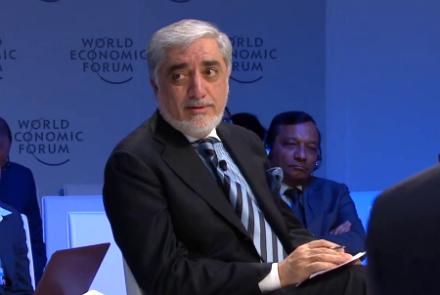Chief Executive Officer Abdullah Abdullah told a panel of leaders on the sidelines of the World Economic Forum in Davos on Wednesday that distrust and unhealthy rivalries on the political front among regional countries has been one of the key drivers of deteriorating economic and commercial cooperation between some nations in South Asia.
Organized under the title “Strategic Outlook On South Asia”, Abdullah explained that manmade barriers to intraregional trade had deprived the people of South Asia of technological development and innovation since the decolonization of the region.
He also said that using terrorism as a source for foreign policy purposes has had a major impact on economic and trade relations between regional countries.
“We must free the rationale of strong trade and economic ties from the clutches of narrowly defined security-centric conceptions in our relations. Countries should not have to bulk-trade through air corridors or circuitous routes when there are cheaper alternatives. We must overcome false conceptions of security, where transit countries render the prosperity of our peoples beholden to the legacies of past conflicts,” he said.
He said that Wagah border, between India and Pakistan, is the shortest land route between Afghanistan and India, but currently the border is closed for trade.
“Wagah which could be the best and shortest land connectivity for us, between Afghanistan and India and vice versa, is not being utilized, in the same way of course its tit-for-tat, the access to central Asia to Tajikistan, we also have a position that if you are not allowing us to utilize this, how can we?,” he said.
He said that Pakistan, Afghanistan and Tajikistan are struggling to sign a trilateral agreement for harnessing trade and economic cooperation among them.
“As far as us and Pakistan are concerned, overcoming the issue of Wagah and also from Pakistan’s perspective their access to central Asia through Tajikistan, the trilateral agreement is something that they are seeking, this will have a big impact on our situation,” said Abdullah.
Meanwhile, the presidential palace (ARG) has said that President Ashraf Ghani left Kabul for Switzerland on Wednesday where he will also attend the World Economic Forum in Davos.
“In-spite of security challenges that we are faced with, in terms of connectivity and also utilizing the potential of Afghanistan, some work has been done; today we have the Chabahar connectivity which will improve the economies of Afghanistan, South Asia and Central Asia. Afghanistan through some regional projects such TAPI, TAP, CASA-1000, Afghanistan has a unique position,” added Abdullah.
This comes amid a report by Pakistani media on Wednesday that Pakistan’s export of goods to Afghanistan dropped by 17.68 percent between July and December last year to $608.533 million against the export of goods worth $739.233 million recorded during same period in 2017.
According to Pakistan’s The Nation, the import of goods from Afghanistan, however, witnessed an increase of 20.47 percent to $85.123 million in the first half of the fiscal year – up from $70.655 million in the July to December period.
Citing latest data released by the State Bank of Pakistan (SBP), The Nation reported that the yearly export of goods to Afghanistan also declined to $74.193 million in December 2018, against exports worth $163.164 million in the same month of the previous year.
The imports also witnessed a decrease of 36.55 percent which fell to $10.238 million in December 2018 against imports worth $16.138 million in the same month of 2017.
On a month-on-month basis, exports from Afghanistan increased by 2.5 percent to $74.193 million against exports worth of $72.389 million recorded during November 2018.

